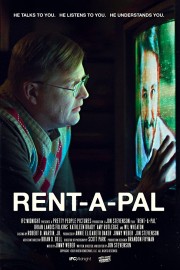Rent-A-Pal
“Rent-A-Pal” is set in 1990, but it could easily be set in 2020. Jon Stevenson’s directorial debut has a lot to say about incel culture and toxic masculinity and the notion of “hopeless romantics” and introverts who struggle with romance. It also has the loneliness of being a caregiver in mind, and when you put all that together, it is a stew for tragedy. This is one of the best movies of the year, and an important one, I think.
If I did not have my wife to support me, and for me to support, I think I would be a lot like David (Brian Landis Folkins) right now. He is a caregiver for his 73-year-old mother, who suffers from dementia, and he is alone to take care of her after his father, Frank (whom his mother, played by Kathleen Brady, often calls him), killed himself a decade ago. It’s a lonely life, and not a lot of women want a guy who lives with his parents. David is sincere, though, and he genuinely wants to find love. Socially awkward, he does something to help with that- make a tape for a video dating service. He also looks at a lot of tapes; however, when he comes back with people he wants to meet, they often don’t want to meet him. He makes a new tape, but his honest one is considered “too long,” and his shorter one is “too awkward.” They might have a match for him, though, in Lisa (Amy Rutledge), but when she is, almost immediately, matched with someone else, someone who seems like an ideal woman for him takes him further down into depression. Back to his solitary, lonely life. When a date with a woman I got to know online in 2001 ended up with me being stood up where we were supposed to go to dinner, needless to say, the reaction I had was not a healthy one; I never heard from her again, nor did I deserve to.
Where does the title come from? When he is picking up a set of videos, he finds a video in a general sale bin called “Rent-A-Pal.” Interested, he buys it, take it home, and he starts watching as the man in the video, Andy (Wil Wheaton), starts his side of the conversation, which David is supposed to fill in. Immediately, David feels a connection with someone for the first time, and Andy’s responses offer a comfort for him to be able to be himself, and have some confidence when, unexpectedly, Lisa’s match falls through, and she is interested in him. When he goes out with Lisa, and has a good time for the first time in forever, it should represent a turning point for David, but his reliance on Andy’s seeming “approval” is strong, by this point, and the self-sabotage begins.
Incel is short for “in-celibate,” and it’s a short hand for a subset of young men whose failures with women, whether real or imagined, has made them look at their lack of love lives as women’s fault, rather than anything they have done. They feel owed sex and romance, and any woman who doesn’t give it to them- or isn’t interested- just adds fuel to their negative view of women, as a whole. If I hadn’t have gotten out of the emotional spiral I was in around 2007-2008, I was very likely well on my way to being the worst type of incel, and succumbing completely to its toxic traits. Maybe I wouldn’t have, because, every time something seemed to implode with women, I would try and look inwards rather than try to pin every ounce of my blame of them, but that date in 2001 I wrote about is a reminder of just how dangerous my worse emotional impulses were to other people, not just myself. “Rent-A-Pal” is about how David gets radicalized, through Andy’s constant “companionship” and friendship, into an incel, someone incapable of recognizing simple kindness and potential, and I couldn’t help but think about Andy in the same way we have YouTube pick-up artists and men’s rights activists now who prey on young men’s insecurities, and a fundamental disrespect for women, to enrich themselves. Of course, Andy’s reactions and interactions stay the same, but- in Wheaton’s fantastic performance- we see a malevolence that feels exactly in line with those who suck young men into an ideology of feeling like any sense of representation and inclusion is “woke” or a shot at white males. Boy, am I glad to have gotten out of that spiral when I did.
David is a genuinely sweet guy when we meet him, but as we get to know him, his inability to handle his mother’s dementia, and his frustration with her, is part of what leads him down the Andy rabbit hole, of feeling like he needs to make a connection. Caregiving is hard- I’ve had to become more of a caregiver towards my mother in recent years, and it’s tough- while the joy on their faces from rewatching an old favorite movie or show they recognize, or remembering some fond memory, is something to cherish, the moments of frustration can wear on you, and the greatest tragedy in Stevenson’s film is that Lisa is the ideal person for David, someone for whom the giving of care comes naturally. Having other people who can ground you is important; unfortunately, the person David finds who could have done that comes too late to help him in all of the ways he needs. The ending feels inevitable, because the right pieces weren’t found in time to save him, and the wrong pieces were allowed to prey on his anxieties and emotions. Sometimes, it’s just going to be too late to get through to broken people, even if we hope we still can. “Rent-A-Pal” is a sad, but riveting, example of that.










